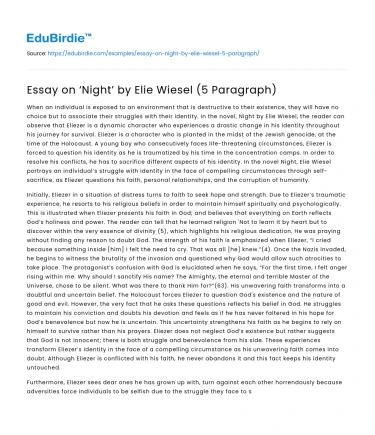When an individual is exposed to an environment that is destructive to their existence, they will have no choice but to associate their struggles with their identity. In the novel, Night by Elie Wiesel, the reader can observe that Eliezer is a dynamic character who experiences a drastic change in his identity throughout his journey for survival. Eliezer is a character who is planted in the midst of the Jewish genocide, at the time of the Holocaust. A young boy who consecutively faces life-threatening circumstances, Eliezer is forced to question his identity as he is traumatized by his time in the concentration camps. In order to resolve his conflicts, he has to sacrifice different aspects of his identity. In the novel Night, Elie Wiesel portrays an individual’s struggle with identity in the face of compelling circumstances through self-sacrifice, as Eliezer questions his faith, personal relationships, and the corruption of humanity.
Initially, Eliezer in a situation of distress turns to faith to seek hope and strength. Due to Eliezer’s traumatic experience, he resorts to his religious beliefs in order to maintain himself spiritually and psychologically. This is illustrated when Eliezer presents his faith in God; and believes that everything on Earth reflects God’s holiness and power. The reader can tell that he learned religion 'Not to learn it by heart but to discover within the very essence of divinity (5), which highlights his religious dedication. He was praying without finding any reason to doubt God. The strength of his faith is emphasized when Eliezer, “I cried because something inside [him] I felt the need to cry. That was all [he] knew.”(4). Once the Nazis invaded, he begins to witness the brutality of the invasion and questioned why God would allow such atrocities to take place. The protagonist’s confusion with God is elucidated when he says, “For the first time, I felt anger rising within me. Why should I sanctify His name? The Almighty, the eternal and terrible Master of the Universe, chose to be silent. What was there to thank Him for?”(63). His unwavering faith transforms into a doubtful and uncertain belief. The Holocaust forces Eliezer to question God's existence and the nature of good and evil. However, the very fact that he asks these questions reflects his belief in God. He struggles to maintain his conviction and doubts his devotion and feels as if he has never faltered in his hope for God’s benevolence but now he is uncertain. This uncertainty strengthens his faith as he begins to rely on himself to survive rather than his prayers. Eliezer does not neglect God’s existence but rather suggests that God is not innocent; there is both struggle and benevolence from his side. These experiences transform Eliezer’s identity in the face of a compelling circumstance as his unwavering faith comes into doubt. Although Eliezer is conflicted with his faith, he never abandons it and this fact keeps his identity untouched.
Save your time!
We can take care of your essay
- Proper editing and formatting
- Free revision, title page, and bibliography
- Flexible prices and money-back guarantee
Furthermore, Eliezer sees dear ones he has grown up with, turn against each other horrendously because adversities force individuals to be selfish due to the struggle they face to survive. For example, bonds such as father and son begin to deteriorate as satisfying primitive needs become a priority into the depths of evil. Eliezer witnesses a son abandon his father for the sake of his own self-preservation which shakes his confidence in his ability to maintain his relationship with his own father. “My God, Lord of the Universe, give me the strength never to do what Rabbi Eliahou’s son has done.”() He begins to doubt the strength of his belief in overall goodness as he is disgusted by the selfishness - of breaking family ties. The death of his father triggers regret and guilt in Eliezer as he feels his selfishness could not prevent it from happening. Eliezer’sHis dependence on his father for love and ’s love for emotional support allows him to endure his humanity and help him survive. The reader can see Eliezer’s strive for survival; “My father’s presence was the only thing that stopped me [from allowing myself to die].”(). Their relationship demonstrates that Eliezer’s love and solidarity are the strong forces that keep his humanity intact.
Ultimately, Eliezer comes to the emotional truth of self-preservation which breeds cruelty and corrupted human souls. In the novel, Eliezer faces similar circumstances when he is forced to survive with his father in life-threatening situations. Initially, Eliezer lives a very protected and pure life devoted to his culture. He believes in the overall goodness of humanity: “A calm, reassuring wind blew through our homes. The shopkeepers were doing good business, the students lived among their books, and the children played in the streets” (6). However, his situation suddenly changes with the invasion of the Nazis, and his people begin to face fear, chaos, and cruelty. a new aspect of their personalities emerges which exposes a darker side of human nature.
Culture and traditions begin to fade in the midst of human brutality and moral turmoil. This is developed actions of the Nazis as “They are committing the greatest indignity human beings can inflict on one another: telling people who have suffered excruciating pain and loss that their pain and loss were illusions.” (). Wiesel develops the moral split which leads each character to have an apathetic attitude towards others. The slaughtering of millions of innocent victims by the Nazis made the Jewish people indifferent to criminal acts. Exposure to violence desensitized people allowing them to inflict pain on one another. The Jews “had forgotten everything--death, fatigue, our natural needs.“() depicting their helpless circumstance. Each character is slowly demoralized and becomes less concerned with civility. The line between goodness and evil is blurred by the moral degeneration around those who experienced the Holocaust.






 Stuck on your essay?
Stuck on your essay?

